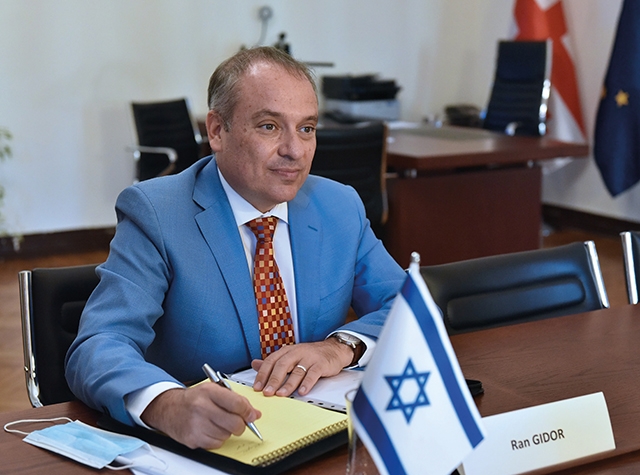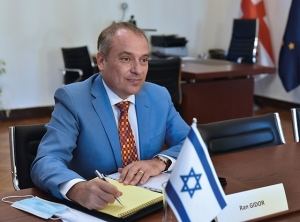UN Warns Humanity Is at a Crossroads. This is How Israel Can Help
Op-Ed
One million species of animals and plants are currently endangered by extinction, including 40% of all amphibious animals, 33% of corals, 33% of marine mammals and around 10% of insects. Three quarters of the terrestrial environment and two thirds of the marine environment have been significantly altered by human activity and huge areas have become desert and lost their fertility. Forests continue to be cut down, fish stocks are dwindling, water, air and land pollution continues at an accelerated rate. The damage to biodiversity, flora and fauna continues with such intensity that the UN warns that "humanity is at a crossroads", and that the continued destruction of natural ecosystems endangers us. This is because nature provides us with essential services that we cannot live without, such as clean air, pollination of agricultural crops, food, raw materials, and more.
The situation in Georgia is hardly any better. According to GSPSA (Georgian Society for the Protection & Safety of Animals): “Georgia’s biodiversity is at significant risk of degradation and degradation of natural habitats, excessive use of natural resources, environmental pollution, invasive alien species, and climate change”.
Against the background of these alarming data and the dire implications for our future, the a biodiversity summit was convened at the end of September to try and coordinate a joint global effort to halt the damage. UN experts say that the damage is still reversible and changeable if we decide to take a number of transformative changes including stopping forests and land destruction and rehabilitating them, shifting to sustainable agriculture, efficient use of water, reducing consumption of animal based foods such as meat and dairy products and switching to a plant-based diet, preventing climate change and protecting and rehabilitating natural systems.
This is a very challenging task, especially with the world’s population expected to grow up to 10 billion people by 2050, something that will increase the pressures on the planet’s already depleted resources. As such, we should all ask ourselves how we can help prevent the impending disaster, and what changes we can make at the individual, local, and national levels to improve nature and biodiversity.
In this context, Israel can contribute greatly through sharing experience and technologies that can, on the one hand, reduce the extent of damage and even restore biodiversity, and on the other hand address the growing needs of humanity for raw materials, food, water and energy. For example, 90% of the wastewater in Israel is purified while 80% of wastewater worldwide it is discharged into rivers and oceans, causing heavy environmental pollution that harms the flora and fauna. It would have been possible to use this for agriculture or revive dried up rivers and streams and save large-scale pumping of water from nature. Preventing water leakage, water conservation, desalination, and the use of saline water in agriculture are all very advanced in Israel and enable the conservation of wetlands and the increase of agricultural crops.
Another area in which Israel can contribute is agriculture, which would significantly increase agricultural production while enabling the protection of open and natural areas on a large scale in the world. Drip irrigation, precise agriculture, use of remote sensing systems and more are some of the practices used in Israel that can greatly help preserve biodiversity and address the needs of the world population in food that is constantly growing. MASHAV (Israel’s International Development Cooperation Agency) has been active in Georgia for almost three decades, and has trained over 1,500 women and men in a wide variety of disciplines and fields of expertise – primarily advanced, environmentally-friendly agricultural & irrigation methods.
Israel is also a global pioneer in the production of animal protein substitutes, which can also help reduce the pressure on natural systems being that 70% of the world’s total agricultural area in the world is used to raise livestock for human consumption. If animal protein could be replaced by laboratory-grown meat or high-quality plant based protein, large swaths of the world could be rehabilitated, the trend of climate change could be slowed down and the food security of billions of people strengthened. Israel has dozens of startups that specialize in the field, research and development institutes, and significant funds are raised to implement the research developments.
Research is also ongoing in the field of renewable energies, including the development and extensive application of technologies such as energy efficiency, energy storage, energy control and more. All of them are important and necessary for the mitigation of the climate crisis.
Israel welcomed and congratulated the Government of Georgia back in 2014 on the adoption of the ambitious Biodiversity Strategy and Action Plan of Georgia (2014-2020), which sets out consistent policies and national priorities to achieve the national vision set by 2030 – “Georgia will be a country where citizens live in harmony with nature, universally Recognized Values of biodiversity; Conservation and prudent use of biological resources ensure the continuity of ecosystem processes, a healthy environment and vital benefits for the whole community. ”
Israel, which has been dealing with extreme climatic conditions for 70 years since its establishment, has developed a wide range of technologies, capabilities and experience that can greatly assist the world in reducing biodiversity loss and moving toward its restoration and renewal. Israel will be happy to share its expertise in these areas, as nature does not recognize human borders and the problem of biodiversity destruction is a universal human problem that demands full international cooperation. Israel is ready to contribute so that we can all continue to see dolphins leaping in the water, hear cranes roaming the sky, smell the scent of wildflowers in the open fields and live in a better and healthier world. On this, as on numerous other issues – Israel is ready, able and willing to stand side by side with our Georgian partners.
By Ambassador of Israel to Georgia, Ran Gidor












